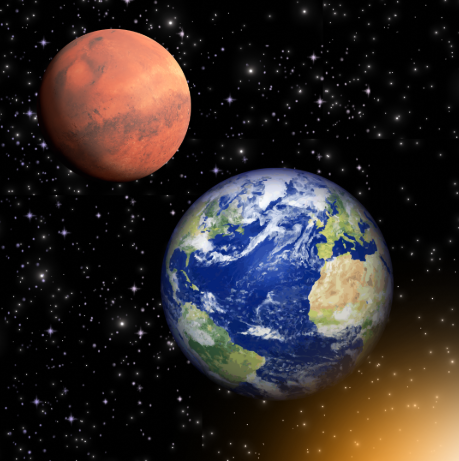Mars, otherwise known as The Red Planet, has interested scientists for potential settlement and exploration for decades. Humanity has already made several great strides in terms of learning more about the cosmos. The James Webb Telescope, for example, launched in 2021. Its infrared technology has allowed scientists access to the farthest stretches of the universe, with star clusters and diffuse features of other galaxies being visible for research. With all these newfound discoveries, as well as the fact humans have already landed on the moon decades ago, many think the next natural step is to colonize Mars.
Mars Habitability
There are reasons why Mars has been selected as the best candidate for potential habitability, though. According to The National Space Society, the planet is rich in nitrogen and carbon, as well as ice and permafrost. The atmosphere is just thick enough to protect potential crops from harmful solar flares, something that would normally be impossible anywhere else in the solar system besides Earth.
With the highest chance of self-sufficiency, as well as its relatively closer proximity to Earth, it’s clear why there have already been many efforts to find out more about Mars in preparation for this future. NASA missions such as the Mars Pathfinder and Mariner Missions are instances of this interest.
The Public Opinion
According to a poll conducted by YouGov, most Americans, specifically, are excited by the prospect of Mars settlement; 57% support the idea of sending astronauts to Mars. Additionally, YouGov was also able to discover that a growing share of people believe that NASA could get humans on the planet by 2040.
YouGov also did another poll, which indicated that one quarter of Americans would be interested in living in a colony on Mars for the rest of their lives. Evidently, the public support for exploration, at least in the United States, is there.
Some, however, think it is crucial that multiple nations are enthusiastic and work with one another in order to settle the planet. Ms. Cureton, an astronomy teacher at Patriot High School, expressed her support for working together in order to reach Mars effectively. “…I do think it’s important we do collaborate with other countries because… our top minds are going to be making the best choices [together], rather than on an ‘island of alone,’” Cureton states.
Other nations most likely realize this—the European Space Agency (ESA) and NASA have already worked together on landing rovers on Mars before. It is likely this kind of collaboration will be seen again in the future in order to establish long-term colonies on the planet.
Additionally, Cureton also mentioned how “[settling Mars] could serve as a stepping stone to get elsewhere in the solar system and colonize other moons or planets… regardless of whether it’s 2030 or 2035 or whenever that mission happens. I do think it would be kind of like a pivot into the future of space travel and living elsewhere other than Earth.”
This is true, as NASA themselves have stated and discussed several new technologies that are advancing in order to reach Mars. These include better heat shields, more powerful propulsion engines, and more. All of these can, and likely will, be used to explore other planets in the future, making the Mars conquest a motivator for consistently improving spaceships or shuttles.
Benefits, Drawbacks, and Conclusion
There are undoubtedly benefits to getting humans to Mars. Scientists already know that Earth will not be habitable forever due to a rapidly expanding sun, as well as an overall increase in temperature that is negatively affecting our planet’s climate. Thus, it is obviously essential that humanity pursues further space conquest before these problems worsen and make Earth completely inhospitable. That is not to say, however, that there aren’t any drawbacks to colonizing Mars in the near future.
According to the Center for Astrophysics, bases on Mars have the potential to act as a place for exploration and mining, which can provide resources like iron, metal, or other precious materials. This causes several concerns, as many regulations would have to be put in place in order to stop devastation from taking hold due to human overconsumption.
While these are issues that can arise, it does appear that Mars colonization does have a fair amount of support. It is important to consider ethical problems when discussing this debate, however; along with resource exploitation, some bring up the point that when Earth is no longer habitable, it is likely only the very wealthy will be able to afford a ticket off the planet. In the meantime, though, it does seem to many that settling the Martian frontier could lead humanity to potentially promising lands for generations centuries to come.







